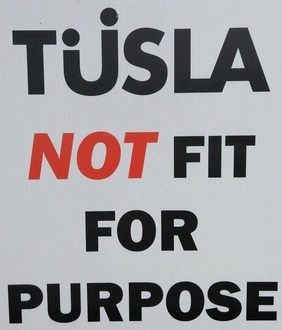- Featured
- Animal Rights
- Anti-racism
- Arts & Culture
- Children
- Climate
- Corporate accountability
- Crime
- Disability rights
- Economic
- Education
- Environment
- Food and Sustainable Production
- Gender Equality
- Governance and Transparency
- Health
- Housing
- LGBT Rights
- Mental health
- Northern Ireland
- Planning
- Privacy and Data Protection
- Rural Inequality
- Social Justice
- Trade
- Transport and Infrastructure
- Workers' Rights
- More
-
Dublin's Health Emergency We need public toilet & hand washing facilities.My name is Richard Hanlon a co-owner of Busyfeet & Coco Cafe Dublin's oldest Fair-trade Cafe on South William street established in 2001. My concern is the lack of availability of public toilets in Dublin's city centre currently and into the future, with only 2 public toilets operational at Connelly & Hueston stations for a city of 650k people at this time. The current crisis has accentuated the urgent issue of the city’s poor hygiene infrastructure which will have an adverse effect on both public health and the survival of city centre commercial areas. Under the road map to reopen Ireland’s society and economy we will move from Phase 1 to Phase 2 on June 8th. This will mean significantly increased movement of citizens and an influx to the city which will be a major event within Dublin. This also will be a key economic turning point for the Dublin city center commerce, but due to ongoing restrictions there will be no accessible toilet or handwashing facilities for the public to use till Phase 3 June 28th. When some hospitality and retailers could allow access to their loos. As an SME operator of coffee shops in both the city centre and suburbs, I am acutely aware of my customers requirement for easily accessible toilets. It is also very clear that the demands between the city and suburbs are vastly different during these times. People using suburban hospitality venues such as neighbourhood cafes for takeaway are within easy access of their own homes and bathroom facilities. The 20 days period between Phase 2 & 3 will be a pivotal time for businesses in the city, who badly need to reopen and help kickstart the economy. The “No Place to Go” feeling will be a negative consequence of having no temporary public toilets available from June 8th in Dublin city centre, making returning custom much less unlikely ‘A first impression is a lasting impression to a customer’. In a survey more than half agreed that the lack of public toilets stopped them from going out as often as they would like. Any further loss to future trade in the coming months in the city centre will be devastating economically, pushing most businesses to bankruptcy. The ‘Urinary leash’ will not only hold back all of us from venturing into the city center but it will hold back the country. There have been too many years of debating and deliberating about public toilets and in 2018 the Green Party hailed the achievement of 300k allocation of funds for public toilets, but this was never used and on the 25th May 2020 meetings with DCC called for temporary public toilets to be facilitated ahead of Phase 2 June 8th, but no budget or allocation could be agreed. Why is it so difficult to talk toilets in a modern age? Dublin is Ireland’s economic engine and 250,000 people work in Dublin 1 and 2 alone. On average, 300,000 people visit Dublin city centre each day, but with the expected drop in footfall due to working from home requirements, reduced transport capacity and social distancing the hospitality sector alone is looking to operate at a maximum of c.45% capacity. We could be looking at up to 150,000 less people a day, which will mean the closure of many. Without the hospitality sector there will be no adequate toilet facilities within Dublin City, so we must come up with a solution for both short term and long term so we can maintain Dublin City as an attractive destination. Who will return to the city centre, when they cannot find toilets and handwashing places during this COVID 19 crisis? Would you? Without people, we have no commerce and Dublin has no future. Dublin City Council has to spend more than a penny now and act for the people of Dublin, so let's see them make a positive move soon and save our Dublin city’s heart from dirt, dereliction and disintegration. City councillors and local politicians are eager to promote the rapid implementation of pedestrianisation of central zones and push for increased cycling as an important step to our future, even during this current health emergency. However, we should be reminded of our past where cycling and public toilets were commonplace and interlinked as we travelled further from our home privies. Does the council want to add to the increased unsanitary practices which are currently taking place in the city? Does the council want to force the public into a situation in which they are unable to wash their hands, when the HSE & our Taoiseach are telling us that it is essential to public health? DCC need to act swiftly or further compound the the ability of the city commercial areas to survive.654 of 800 SignaturesCreated by Richard Hanlon
-
Bank of Ireland - Keep your Monasterevin and Kilcullen branches openThese smaller branches are a key part of the local economy in towns like Monasterevin and Kilcullen. They are particularly important to older people who are not equipped to follow the trend that the banks are pushing towards online banking. The presence of a bank in small towns is a key reason why small businesses choose to locate there. They are also an important consideration when people choose to move to rural areas.100 of 200 SignaturesCreated by Noel Connolly
-
Nursing homes need to use Personal Protective Equipment (PPE)Clusters of COVID-19 are emerging in Nursing homes across the country putting very vulnerable people at risk. In order to protect residents and to cut down on the number of infections, staff in Nursing homes need to use Personal Protective Equipment (PPE) at all times irrespective of whether or not they themselves are symptomatic.196 of 200 SignaturesCreated by Bobby McCormack
-
Keep Ireland's Health System in Public Ownership after COVID-19Following the 2017 Dáil committee, on the future on Health in Ireland, it was agreed by all parties that a single-tiered healthcare system, called Sláintecare, was the best way forward. (2) Fine Gael agreed to implement this but dragged their feet, lacking the commitment to fully fund the programme and not making it a priority. (3) Now, in the face of a global pandemic it is evident that Sláintecare is necessary to protect and care for the people of Ireland. 1) (https://www.irishtimes.com/news/politics/election-2020-exit-poll-confirms-health-housing-homelessness-of-most-concern-to-voters-1.4167030) 2) (https://www.oireachtas.ie/en/committees/32/future-of-healthcare/) 3) (https://www.irishtimes.com/news/politics/social-democrats-implementing-sl%C3%A1intecare-health-plan-a-red-line-for-coalition-1.4142849)324 of 400 SignaturesCreated by Dylan Murphy
-
Introduce remote consultations for abortion during covid-19Both the Abortion Rights Campaign and the Government want to keep people safe during this emergency. It is in all of our interest to minimise the strain on our healthcare system and to prevent people who are not sick from coming into contact with those who are. Remote consultation is already in use in Ireland by, for example, VideoDoc and Spectrum Health, and more recently, by individual GPs as they adapt to the current crisis. Providing abortion consultations remotely has proven safe, effective, and acceptable in other jurisdictions. We urge the Minister for Health to clarify that an in-person visit is not required in order to satisfy the Act and put appropriate protocols in place. We urge the Minister for Justice to assure doctors they will not be prosecuted if they offer medical abortion remotely at this time. Sign the petition and let the Government know you support those who need to access abortion services, healthcare workers and all those working in the health sector.331 of 400 SignaturesCreated by Abortion Rights Campaign
-
Close Northern Ireland schools, colleges & early years now!This is a major challenge to the health well being of all our communities. It is crucial to stop the spread of the infection. It is recognizing the right of all to health and life.115 of 200 SignaturesCreated by Siobhan Mc Laughlin
-
Allow An Garda Síochána Make Emergency Barring OrdersA toxic combination of being cut off from family and friends, shut refuges, financial hardship, loss of work, closed schools and community services means women experiencing violence are in great danger because of Covid19. The Courts are barely open and even though they say they'll continue to hear emergency domestic violence cases, it's clear that it victims won't be able to get emergency barring orders because all other services they need - from childcare, support workers, transport, legal advice will be either non-existent or too hard to access. Its not clear what will happen if we are ordered to go into full lockdown. Women and children experiencing violence will effectively be locked in with violent partners - and no support system. The Istanbul Convention to which Ireland is a signatory requires for special measures to be taken to prevent and protect women from gender-based violence. 22 other European Countries that are signatories to the Istanbul Convention have already granted special powers to police to make Emergency Barring Orders Regions that have already seen large numbers of Covid-19 cases such as China and have taken measures to reduce the spread by confining people to their homes have reported significant increases in incidents of domestic violence. The time to act is now. About Sisi Sisi is a collective of survivors of intimate abuse in Ireland. It formed in Aug 2018 as an action group and voice for women. This is a unique survivor led platform in Ireland, and is a highly innovative way to bring lived survivor experience to inform state institutions and policies. Our vision is an Ireland where women are free from violence, including sexual abuse and coercive control. Our mission is to support women survivors of violence, including domestic abuse and coercive control, to be leaders, and to grow and develop utilizing their lived experiences and by taking collective action in the pursuit of freedom, equality and structural change.1,745 of 2,000 SignaturesCreated by Sisi

-
PledgeWe are in the containment stage of this virus. Holding mass nationwide gatherings will increase community contact and endanger the vunerable and others to infection. Our health service can't cope with normal flu never mind Corona Virus let's help out and pledge none attendance and participation in all St Patrick days events11 of 100 SignaturesCreated by Anna Doyle
-
The Right Inclusion Model for Every ChildOur schools are facing overwhelming challenges in the provision of education for our children with special needs. The campaign for The Right Inclusion Model for Every Child calls for the State to provide for the rights of every child to an education. To respect the rights of all of our children, sufficient resources must be provided to those who have special educational needs. The Proclamation of our Republic promises to ‘cherish all the children of the nation equally’. Under the current model, inadequate resourcing means that children with additional needs are not guaranteed their right to equal access to education. The goal of our campaign is to achieve cross-party support for The Right Inclusion Model for Every Child ahead of the General Election and to have the principles of this model included on the next Programme for Government. We assert that The Right Inclusion Model for Every Child must include; • SNA allocation to match the needs of the children • Transparency in the Process: There are currently not enough SNAs in the system to match the needs and the appeals process is not fit for purpose. The proposed General Allocation Model cannot match the needs going forward, given that current needs are not being met. Meaningful consultation with schools, parents and children’s advocacy groups is necessary to inform the right inclusion model. • Multi-Disciplinary teams: Immediate removal of waiting lists for Assessment of Need to ensure timely, appropriate access to multi-disciplinary services. This will require considerable increases in staffing and resourcing of the various services. • Options for children and their families: To have options of placements in mainstream schools, special classes within mainstream schools, and special schools according to each child’s needs. We are asking for every General Election Candidate to sign up to our campaign and to pledge to deliver The Right Inclusion Model for Every Child as a matter of priority in the next government.1,846 of 2,000 SignaturesCreated by Liz Carrigy
-
Save Our Reading Schools"However small the chance might be of striking lucky, the chance was always there." - Roald Dahl. We have promised to cherish the children of this nation equally. Every child deserves the chance to read and thrive.5,814 of 6,000 SignaturesCreated by Doireann O'Neill
-
Public Inquiry Into Tusla PetitionThe failures of mothers and babies in the past in being excused on the grounds of ignorance. Future generations will never forgive this generation for a failure to hold TUSLA to account for it's incompetence to parents and children. TUSLA'S remit is very far reaching covering areas beyond child protection and welfare including domestic sexual and gender based violence services, retention of adoption records, early years services and education welfare. TUSLA is responsible for the most venerable members of our society, OUR CHILDREN,PAST AND PRESENT. Their failures will have lasting effects for many decades into the future. While there have been inquiries into some aspects of how TUSLA operates, there has never been a public inquiry into TUSLA as an overall body.2,270 of 3,000 SignaturesCreated by Barbara Scanlon
-
Reinstate Bus Stops On Bettystown RouteThe service has become inaccessible to those with disability and mobility issues. It is having a negative effect on many commuters for little gain. Journey times have not decreased as advised, in fact due to the removal of stops the journey time has increased in many cases. With bad weather and poor visability, the removal of some stops has put an immediate risk to passengers, who must now walk through poorly lit roads to reach thier closest stop.440 of 500 SignaturesCreated by Nathan Hallett






.png)





